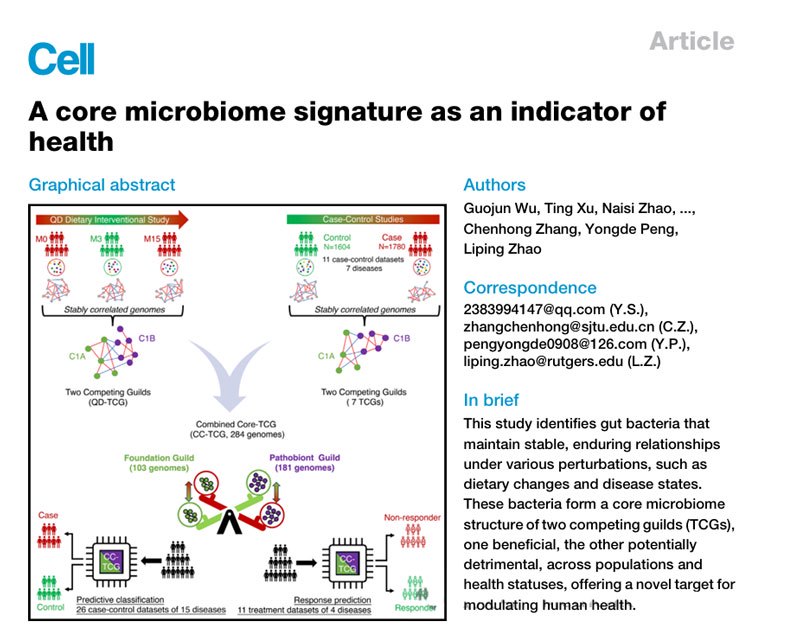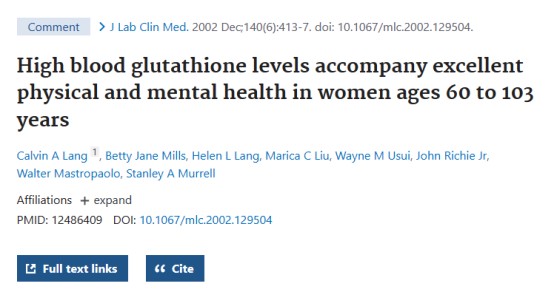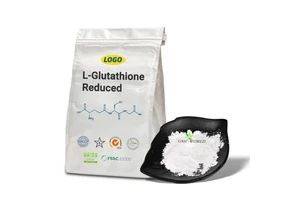Gut microbiota may predict human health
Shanghai Jiao Tong University and Rutgers University "Joint Laboratory of microbiome and Human health", Shanghai First People's Hospital and Qidong People's Hospital jointly published the paper "Cell" A core microbiome signature as an indicator of health.
Research leader and joint laboratory director, Professor Zhao Liping of Rutgers University in the United States, said that his team used a high-resolution data mining platform developed by himself to integrate the original data of 38 intestinal flora studies from three continents, involving 15 diseases, and for the first time identified two groups of core flora members that are essential to human health maintenance. Namely, "cornerstone functional group" and "diseased functional group" bacteria.

The team refers to those microbial communities that primarily produce short-chain fatty acids as "cornerstone flora" because they secrete short-chain fatty acids to reduce gut pH and inhibit the overreproduction of opportunistic pathogens, similar to the role of large trees in maintaining ecological balance as "cornerstone species" in the forest.
The community of conditioned pathogens is referred to as "pathogenic flora" rather than "pathogen flora" or "harmful flora" because these bacteria, when present in moderate numbers, are essential to the normal functioning of the human immune system and are part of the core microbiome.
It's only when their numbers get out of control that they become a health threat.
In a randomized controlled trial of a high-fiber diet intervention in 110 patients with type 2 diabetes, the research team developed a high-resolution microbiota sequencing and big data analysis technique.
They divided intestinal bacteria into "functional groups" based on their cooperative or competitive behavior patterns, and screened 141 strains of bacteria that maintained stable cooperative or competitive relationships at multiple time points.
They found a "seesaw" -like network structure, where groups of bacteria move in and out of each other to affect human health.
The study found that the balance of the two major functional groups in the gut can be adjusted through precise nutritional interventions, enhancing the advantages of the cornerstone functional group and thereby improving the health of patients.
Professor Zhao noted that these changes in microbiome proportions appear earlier than disease symptoms, providing new avenues for personalized disease prevention, treatment and health management.
The team further integrated data from 11 immunotherapy clinical trials in advanced melanoma, B-cell lymphoma, inflammatory bowel disease, and rheumatoid arthritis, using a "seesaw" model to predict patient response to immunotherapy with clinical accuracy.
This discovery helps doctors predict patients' responses to different therapies before treatment, optimize treatment plans, and improve the accuracy and effectiveness of treatment.
Professor Zhao Liping believes that the use of gut microbes for treatment is the future direction of medical development.
Gut microbiota not only affects gut health, but also involves systemic immunity and the health of distal organs, so the intervention of gut microbiota will become an important part of future disease treatment.
Regarding whether dietary intervention can really change the microbiota structure of patients, Professor Zhao Liping distinguished two types of intestinal microbiota disorders:
Type D Disorder:
The diversity of cornerstone functional groups is not reduced but the number is insufficient, and it is necessary to promote its growth by supplemting dietary fiber and other nutrients to restore the balance of flora.
"L-shaped misalignment" :
A severe loss of keystone functional group species, commonly seen after prolonged antibiotic use or severe intestinal infection, requires the reintroduction of key bacteria and the provision of specific nutrients to restore healthy microbiome characteristics.
Professor Zhao Liping revealed that future research will focus on cornerstone functional groups, develop clinical tests and treatment protocols, and verify their effects in a variety of diseases.
They have developed personalized testing technologies, nutritional support technologies, and microbiome transplantation technologies that enable personalized interventions based on a patient's specific circumstances.
These techniques have been standardized and tools such as kits have been developed, which can be widely used for microbiome adjustment in patients with different diseases.
Professor Zhao called on the medical community and all sectors of society to work together and cooperate deeply to focus on microbial recovery and maintenance.
He stressed that this study not only reveals the members of the intestinal core flora and their ecological laws, but also points out a new direction for the field of precision medicine and personalized medicine, especially for increasingly common diseases such as diabetes, by adjusting the imbalance of intestinal flora, it can bring new hope to patients.













